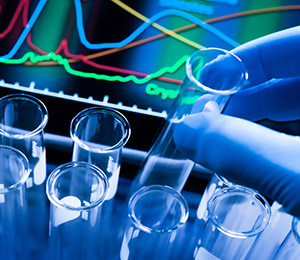
Biomarker analysis: Personalised medicine
Determination of individual biomarkers is firmly established in personalised or individualised medicine. These are biological processes that can be measured as lab parameters in the blood count. They are highly valuable indicators and decision-making aids for diagnosis and progress prognosis of complex illnesses, as well as for planning of individualised treatment. A biomarker can be cells, genes, gene products or specific molecules such as enzymes or hormones. Biomarker analysis in our lab enables us to diagnose possible cell defects on a genetic level.
We distinguish between illness-related and medicine-related biomarkers. They supply information on:
- Whether illness threatens (risk indicator, predictive biomarker)
- Whether there is an illness (diagnostic biomarker)
- Likely further development of the illness in the specific case (prognostic biomarker)
- What medicine to choose, i.e. how the individual organism will react to a medicine
Tumour stem cells, for example, express, among others, the following molecular oncoproteins that we use as diagnostic biomarkers:
| myc | p53m | EGFR | erb/B2 | erb/B3 |
| CD44 | MDR | VEGF | Survivin | PSA |
| CEA | Melanoma | GFAP | CA125 | CA15-3 |
| CA19-9 | ras src | Erb | AKT | mTOR |
| c-met | uPA | Ido | Oct-3/4 | ERa |

Blood analysis
The amount and precision or our measurements of amino acids, minerals, vitamins, and pathogens in our Munich lab is unique.

Apheresis
Our concept combines conventional and alternative methods. Apheresis procedures are an important diagnostic and therapeutic component of our integrative medicine.

Immunotherapy
By multiplying the body's own killer cells we activate the immune system target specific. Among other things for the treatment of cancer and viral diseases.





